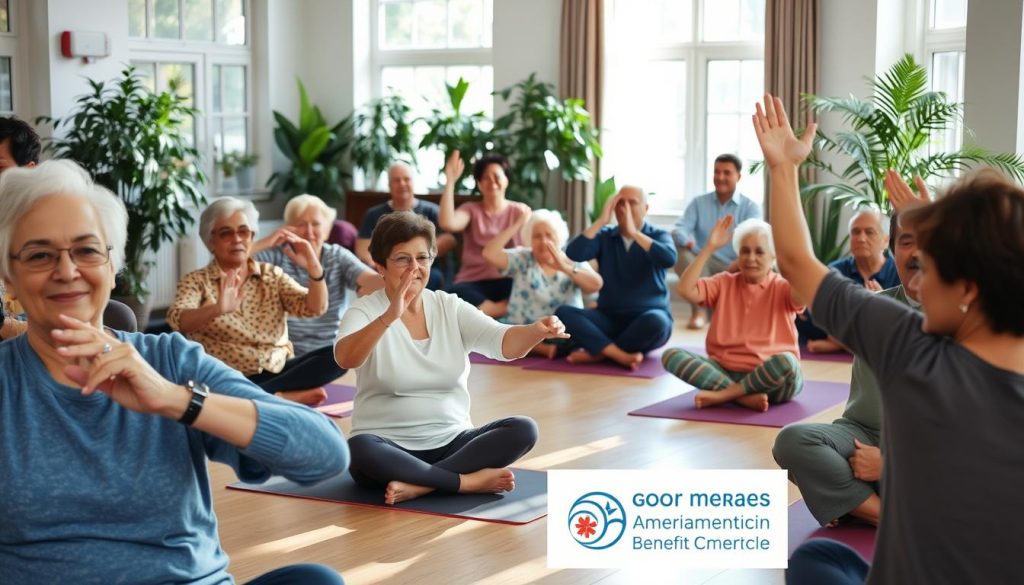Are we ready to support our seniors’ unique health needs? By 2030, every baby boomer in the U.S. will be over 65. That means, one in every five people will be at retirement age1. This change asks big questions about our senior healthcare services. Currently, 88% of older adults deal with at least one multiple chronic condition (MCC)1. With fewer doctors and health workers on the horizon12, we must figure out how to best support our seniors.
Elderly healthcare is complex. It’s not just about medical care but also involves healthcare advocates. We need good talks and planning for money challenges. Let’s explore how to navigate these critical services. This way, we ensure dignity and care for our aging loved ones.
Key Takeaways
- By 2030, one in every five U.S. residents will be over the age of 65 affecting healthcare resources.
- 88% of older adults confront multiple chronic conditions leading to higher healthcare costs.
- There is a looming physician shortage estimated to reach 139,000 by 2038 in the U.S.
- Effective communication with healthcare providers is crucial for quality geriatric care.
- Financial planning is vital for managing healthcare costs associated with elderly care.
- Community resources play a key role in supporting elderly individuals and their caregivers.
The Importance of Geriatric Healthcare Services
Geriatric healthcare helps those who are older, mainly because they often have long-term illnesses. About 78% of people over 65 have at least one such illness. This fact shows why senior health services are so needed3. Many elderly also take several medicines. This can make their health worse if not managed right4. So, it’s crucial to manage medicines well and support a healthy lifestyle4.
Care for older people is not just about dealing with sickness. It’s also about stopping problems before they start. This includes care for arthritis, memory issues, and high blood pressure4.
Nowadays, many old people prefer to stay at home as they age. Special care at home helps them handle chronic pain. It also helps them stay active with therapy and helpful tools5. Regular doctor visits are key. They help find health problems early, making life better5.
Being alone can be a big problem for the elderly. That’s why making friends and staying active in the community is part of their care. This keeps their minds sharp and helps them feel included5. Geriatric healthcare services play a big role. They help old people stay healthy as they get older3. By focusing on each person’s needs, they cut healthcare costs. They also make fewer hospital visits necessary, which is good for everyone4.
Understanding the Aging Population’s Healthcare Needs
The aging population has complex elderly healthcare needs. This includes chronic illnesses and mobility issues. Older adults, especially those over 65, made up 17% of the population in 2020. This number will likely increase to 22% by 204067. About 88% of older people have multiple chronic conditions, making healthcare tricky6.
Money matters a lot for older adults’ health. Those with less money often face disabilities and live shorter lives67. Eight out of ten seniors find medical documents hard to understand. This makes managing their health tough6. Also, unpaid caregivers provide most of the care for seniors. This shows we need better gerontology services to help caregivers and the elderly8.
It’s important to look at the social factors affecting older adults’ health. Things like income and transportation matter a lot. In the U.S., 1 in 4 older adults feels isolated. This makes their healthcare needs even more complicated67.
Challenges in Accessing Geriatric Healthcare Services
Getting to doctor’s appointments can be hard for older people. They often find the healthcare system tricky to get around. A study shows 62% have trouble finding the right care for long-term issues9. Living far from the city can make it even harder to get to the doctor.
In the U.S., there aren’t enough doctors who know how to care for the aging. This is worrying as more people are living longer. By 2050, we’ll have twice as many folks over 6010. Culture and society also play a part in making it tough for them to get care.
Money problems are a big hurdle too, with 43% of older adults not having enough to cover health costs9. Getting older often means more health troubles, but some have to skip seeing a doctor to save money. About 11% of those with Medicare put off care because they couldn’t afford it between 1995 and 199711. This can make their health even worse over time.
It’s super important for everyone involved in healthcare to come up with new ideas to help seniors. Making plans together and using community help can make a big difference. They’re working on making it easier and better for older folks. To learn more about fixing these problems, click this link.
Key Components of Geriatric Medical Care
Good care for older folks focuses on many important parts. These help improve their health. Finding health issues in seniors is key, as many have three or more problems12. Care plans are made just for them. This helps manage issues like diabetes and high blood pressure1314. Different health workers make sure seniors get smooth care across all areas.
Preventive care is also key to keep seniors healthy. It includes regular check-ups, shots, and learning about health13. Care managers help them through big health care changes14.
Support for mental health is important too, helping with sadness and worry13. Help with daily tasks allows seniors to live on their own1412. This care looks after their body and mind needs.
Engaging Healthcare Advocates for Seniors
Having advocates is key for seniors when it comes to healthcare. They help seniors understand bills, work with officials, and choose wisely in tough times15. It’s great when seniors have friends or family to go with them to visits. This support helps make sure nothing important is missed15. Senior centers and advocacy groups also offer help by connecting them to healthcare guides. This helps seniors get better access to health services.
Advocates come from many backgrounds and add a lot to seniors’ lives16. They help find what seniors need, plan care, and schedule visits. They guide seniors through choices, talk to doctors for them, and deal with paperwork15. The American Geriatrics Society, with over 6,700 members, pushes for advocacy. They want to better health and freedom for the elderly17.
Advocacy gives seniors more control over their care, making it easier to decide what’s best for them15. This work helps not just one senior, but aims to improve rules for all older people16. With advocates and medical teams working together, seniors get all the support they need. This makes sure they get the best care possible.
Creating Effective Communication Channels with Healthcare Providers
Clear talks between older people and doctors are key for good health outcomes. The world’s aging population is growing. So, good communication is very important18. Many older people have trouble hearing or seeing. This makes talks with doctors harder19. For example, many older adults can’t hear well. This problem gets more common as people age19.
Seniors should list their medicines and questions before appointments. This helps make talks better. It lets doctors give care that fits the needs of each one18. Training staff to talk well helps caregivers work together better. This makes care safe and smooth18.
Using tools like amplifiers helps with hearing problems. Big print for those with weak eyes is also helpful19. Caregivers bringing seniors to visits shows how important support is. It helps in talks not just with the doctor but within the family too19.
New tech improves talks, including video chats for families. Listening well and making care plans for each person are good ways to communicate in senior care18.

Financial Planning for Elderly Healthcare
Planning your money well is key for handling elderly healthcare. About 70% of folks over 65 will need long-term care20. Knowing about Medicare and Medicaid is vital as health costs can go up. Some places help pay for long-term care with Medicaid20.
Many can get help paying for care from the government or special groups. This is true for veterans or those with certain sicknesses. Long-term care insurance helps with staying at home, but what it covers varies20. It’s smart to talk to financial pros. They can help make sense of it all and think about taxes and what you leave behind20.
In lots of states, there are experts to help with money matters for older care. For example, California has 14 groups, Florida nine, and Texas six21. Texas also offers help to learn about insurance for long-term care21.
Now, over 46 million people are 65 or older in the U.S. This number will grow a lot by 205022. So, it’s really important to plan finances well for later years. This way, retirees can get the care they need without huge costs22.
Utilizing Community Resources for Elderly Care
Local groups offer lots of help for elderly care. This help includes senior care services like meals at home, help getting around, and fun group activities. These services make life better for older people. Over 20% of people 60 or older get help from these community groups. This shows how important it is to use these resources for better health23.
Families help a lot in finding aging care services in their area. Going to local senior centers helps get important services. It also lets older people meet others and not feel lonely. In places far from cities, 73% of older people want to stay in their homes. They may need changes to their homes to live safely24.
Community groups offer many kinds of help. They give health checks and teach about staying healthy25. Help for those taking care of family members lowers stress. It’s important for families to find and use all the help they can. This includes looking for ways to pay for these services.
Learning about these resources helps support older family members. It keeps them happy and independent. To find out more about getting this help, families can check this site.
Recognizing Signs to Seek Geriatric Care
It’s crucial to know when an elder needs geriatric care. Families should watch for sudden weight changes. Such changes can mean poor eating habits or health troubles26. Mobility issues also show a need for care. They make everyday tasks hard, like cooking and cleaning26.
Don’t ignore emotional or brain health changes. Signs like memory loss or trouble with money may mean brain decline. This often needs special care26. Many elders juggle several chronic sicknesses. These issues need ongoing help to stop worse problems27.
Spotting these symptoms early can help the elder’s life get better. Bad hygiene can cause skin problems. Being very irritable might mean mental health issues26. Seniors fit into groups: young-old (65-74), middle-old (75-84), and old-old (85+). Each group has different health care needs27.
Seeing these signs and getting care early helps manage health issues. This keeps respect and well-being. Families should act fast when they see these signs. This ensures the right support. For help finding a geriatrician, here are some useful tools for this important step.
Utilizing Elderly Wellness Programs
Elderly wellness programs are very important. They help keep older adults healthy and happy. These programs include health education, advice on eating right, and exercises. They help old people connect with others and stay fit.
These programs prevent health problems in several ways. They teach health, check for diseases early, and help manage long-term illnesses to avoid disability28. After COVID-19, more seniors are using online resources to stay healthy. This makes joining wellness programs easy28.
Wellness programs are key in managing diseases like high blood pressure and diabetes in the elderly. Studies show that not having enough money and feeling sad can make it hard for seniors to sleep. This shows how vital wellness programs are29.
| Aspect of Elderly Wellness Programs | Benefits |
|---|---|
| Physical Exercise | Enhances mobility and reduces fall risk |
| Nutrition Counseling | Promotes healthy eating habits |
| Chronic Disease Management | Prevents disability and improves health outcomes |
| Community Engagement | Fosters social interaction and support |
Using the Age-Friendly Health Systems (AFHS) framework makes wellness programs better. It focuses on medicine, moving around, and mental health. It helps seniors live healthier and lessens their need for hospital care28.

Transitioning to Home-Based Care or Assisted Living
Moving to home-based care or assisted living can be tough for many seniors and their families. They must look at what help is needed daily, like with activities or health care. Planning well makes the change smoother, so the elderly get the best care possible.
Assisted living places often have either one price for everything or different levels of help costing more30. Families should visit many places and ask lots of questions to learn about the care and place30. Talking openly about these changes can make everyone feel less worried and more sure about their choices.
- Home-based care offers many kinds of help like personal care, housework, meals, and getting around31.
- For an easier move to assisted living, make the new place feel like home with familiar things30.
- Joining in with community activities can help new residents make friends30.
- Eating with others is good for making friends and feeling part of the community30.
Making homes safe and easy to move around in is key for seniors staying at home as they age31. Money for home-based care can come from savings, help from the government, or insurance31. Families need to think about insurance, costs, and having someone to support their loved ones in this big change32.
Conclusion
Finding good healthcare for older folks can seem hard. But, knowing what help is out there makes it easier. By 2030, about one in six people will be 60 or older. This shows how much we need good elder care that people can easily get to33. A team effort with caregivers, health helpers, and programs in the community helps a lot. It makes a place where support is strong. And it makes talking and money planning better, which improves health services for older folks34.
The number of people over 60 will reach 1.4 billion by 2030. So, getting to geriatric healthcare quickly is very important. Good care looks after the medical and happiness needs of the elderly. Many studies showed this makes a big difference in the quality of healthcare33. If we learn and get ready, older folks will live happier, healthier lives. This changes how we see aging and care in our places.
Source Links
- Healthcare on the brink: navigating the challenges of an aging society in the United States
- Navigating the Complexities of Elderly Care: A Comprehensive Guide for Families
- The Importance of Geriatric Primary Care | Geriatric Doctors
- The Importance of Geriatric Care: Primary Care Associates of Maryland: Family Medicine
- Everything You Need to Know About Geriatric Care | Importance
- Social Determinants of Health and Older Adults
- The Health of Aging Populations – Preparing for an Aging World
- Understanding the care and support needs of older people: a scoping review and categorisation using the WHO international classification of functioning, disability and health framework (ICF) – BMC Geriatrics
- Biggest Challenges and Problems for Elderly People in Society
- Ageing and health
- Barriers to Health Care Access Among the Elderly and Who Perceives Them
- Basic Facts about Geriatrics | Aging & Health A-Z | American Geriatrics Society
- Specialized Geriatric Medical Care – The Health & Wellness Clinic KC
- What Is Geriatric Care? | APEX Health Services
- Patient Advocacy: When You Need Someone to Go to Bat for Your Senior – Institute on Aging
- Pathways in Geriatrics: Advocates | American Geriatrics Society
- Aging and Disability Advocates and Service Providers
- Effective Communication Strategies in Senior Care: Empowering Residents, Families, and Caregivers – MedCity News
- Talking With Your Older Patients
- Paying for Long-Term Care
- Caring for Your Parents | Finances : Start Planning Now
- The growing need for resources to help older adults manage their financial and healthcare choices
- Community-Based Supports and Services for Older Adults: A Primer for Clinicians
- Community Supports for Rural Aging in Place and Independent Living Overview – Rural Health Information Hub
- Community Based Services – Senior Resources
- How to Recognize When It’s Time for Senior Care Services? » Open Heaven Elderly Care LLC
- Understanding Adult Vs Geriatric Care: A Comprehensive Guide | Decent
- Using the Age-Friendly Health Systems Framework to Track Wellness and Health Promotion Priorities of Older Adults in the Global Community
- International Journal of Environmental Research and Public Health
- 15 Tips to Help Ease the Transition to Assisted Living
- Aging in Place: Growing Older at Home
- Managing the Transition From Hospital to Rehab to Home
- Impact of healthcare service quality on older people’s satisfaction at geriatric medical centers: a rapid review
- 13. Conclusion | ATrain Education

Leave a Reply